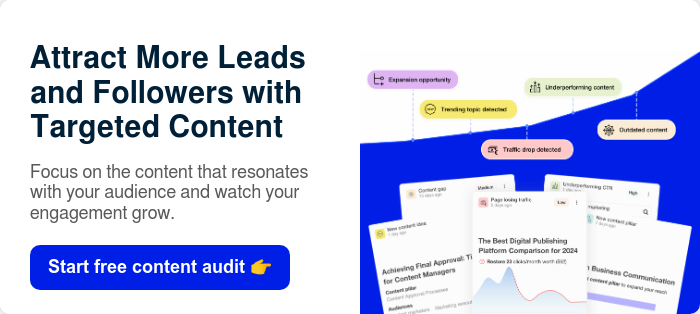As a B2B marketing agency, making a memorable first impression is critical, no matter what you pitch. Think of the countless proposals a potential client might sift through. What makes yours stand out? A persuasive marketing proposal is your agency's ticket to capturing attention, building trust, and laying the foundation for a fruitful partnership.
So, what goes into creating this game-changing proposal? Let's dive in and uncover the secrets to crafting a proposal that not only impresses but also converts.
What is a marketing proposal?
A marketing proposal is a document that includes your agency’s services and solutions, along with the payment terms, crafted specifically for your prospect’s needs. Your proposal reflects a narrative that intertwines their pain points with your strategies. Ultimately, you share a story where their success is inevitable with your agency as their partner. You’re basically saying they can only meet their marketing goals with you.
Of course, you shouldn’t just rely on a winning marketing proposal to get clients. In this digital age, potential clients won’t just look at your proposal to determine whether you’re capable or not. They’re likely also to Google more information about your agency. So, make sure all your marketing channels are visually appealing. Your social media channels should reflect your branding. You should also leverage the best website for SEO hosting. You want to ensure your website loads quickly if potential clients access it.
Ready to supercharge lead generation? Let content be your magnet! Join the ranks of 5,000 successful businesses using StoryChief to attract more leads through content. Get started for free today.
What to consider when writing a marketing proposal
In sum, you want to write a marketing business proposal that communicates and captivates at the same time, ensuring your agency isn’t just seen but also remembered. The good news is, it’s not impossible. Just follow these three general tips and you can ensure a winning marketing proposal, regardless of the potential client you pitch to:
1. Focus on the client
At the heart of every winning marketing proposal is the client. It's easy to get caught up in showcasing your agency's prowess, but, as I said earlier, a proposal is not a brag sheet. It's a solution map tailored to the client's journey. You can focus on the client effectively if you:
- Understand their pain points. Before drafting your marketing proposal, invest time in understanding the client’s challenges. Are they struggling with brand visibility? Is their conversion rate dwindling? By pinpointing these pain points, your proposal can offer targeted solutions that resonate.
- Tailor your language. Speak their language. If they refer to "customers" instead of "users," do the same. This subtle alignment shows you're truly in tune with their brand and culture.
- Highlight their goals. Begin your proposal by reiterating their objectives. This not only shows that you've been listening but also sets the stage for the solutions you're about to present.
- Use testimonials strategically. Incorporate testimonials from previous clients with similar challenges. Happy client stories build credibility and also show potential customers that you've successfully tackled similar issues before. With testimonials arranged strategically throughout your proposal, you can also help potential clients overcome any doubts they may have about your brand.
The more client-centric your proposal, the more effective it will be.
You can determine your potential client’s needs by just asking them straight. Before drafting your proposal, you’ll probably have an initial meeting with them. This is the time you ask as many questions as possible. Don’t forget to get their contact details–like their email address, for example—so you can ask questions you might have forgotten to ask in your initial meeting.
You can get critical information about what your clients want by looking at their marketing platforms–like their website and social media channels–as well.
2. Clearly state the issue and its resolution
Clarity is critical to effective communication. When writing a marketing proposal, there's no room for vagueness. You need your potential clients to fully understand that your strategies are the best ways to resolve their pain points. To ensure this:
- Identify the problem. Explicitly state the client's challenge in your marketing proposal. This shows the prospective client that you understand their situation but also sets the context for the solutions you're about to propose. For instance, if a client is grappling with limited reach, state it clearly: "Your brand has a strong value proposition but struggles with reaching a wider target audience."
- Present a direct solution. Follow up the problem statement with an actionable solution that will directly–not just indirectly—address it. Using the previous example, you could suggest implementing a robust SaaS link building strategy that will tap into new markets and demographics.
- Use data where possible. Support your solutions with data. If you're suggesting a specific marketing project, provide statistics or case studies that demonstrate its effectiveness. For instance, "Brands that have adopted a social selling strategy on LinkedIn have seen a 25% increase in winning deals within six months."
- Avoid jargon. While it's essential to be professional, avoid drowning the client in industry jargon. Keep the language simple, direct, and easy to understand. Instead of saying "optimize the conversion funnel," you might say "improve the steps your customers take to make a purchase."
- Provide a timeline. Alongside each solution, offer a realistic completion timeline. A time frame sets expectations while giving the client a clear picture of the journey ahead.
By clearly articulating the issue and its resolution, you're building a narrative that's easy for the client to follow. It's a story where their challenges are met with your expertise, leading to a happy ending for both parties.
3. Be precise
If you want your marketing proposal to win, precision is paramount. So, It's not just about what you say, but how succinctly you say it. Clients are often inundated with information, and your proposal must cut through the noise, delivering clear and concise solutions. For this, do the following:
- Avoid fluff. Every word in your proposal should serve a purpose. Instead of saying, "We offer a wide range of top-tier, high-quality marketing services," opt for "We provide expert marketing services tailored to your needs."
- Use specifics. Generalities can muddle your message. If you're suggesting a strategy to boost social media engagement, instead of recommending "more campaigns on social media platforms," suggest a "30-day Instagram campaign that will drive overall engagement rate by X% by ensuring more Instagram likes, comments, and shares.”
- Break down complex ideas. If a concept is intricate, break it down. Use bullet points, infographics, or step-by-step processes to make it digestible. For instance, if you're introducing a prospective client to a new social media strategy, provide a brief breakdown of its specific benefits and how it can enhance their online presence.
- Set clear deliverables. Outline what the client can expect. If you're proposing a content marketing strategy, list out specifics: "10 blog posts, five infographics, and three video scripts tailored to your brand."
- Reiterate outcomes. After presenting a solution, restate the expected outcome. For example, "By adopting our suggested PPC strategy, we anticipate a 20% increase in your website's traffic within three months."
Precision enhances clarity and, therefore, builds trust. When clients see that you've taken the time to be meticulous in your proposal, they're more likely to believe in your ability to deliver results.
3 marketing proposal examples
While theory and guidelines lay down the foundation, it's the application through well-designed templates that truly brings concepts to life. By examining real-world templates, we can glean insights into what works and what resonates with potential clients.
Let’s explore three different marketing proposal templates, each offering a unique perspective and approach. Through these templates, we'll uncover the nuances and strategies that enable crafting a proposal that’s not just good, but exceptional.
1. PandaDoc marketing proposal
In this example, PandaDoc presents a structured 13-page proposal template for marketing a new product or service.

The template includes key elements such as a cover letter and executive summary. It also helps you articulate the problem, marketing needs, opportunities, solutions, and metrics among others. Its structured approach helps you effectively detail the marketing strategies and services aligned with the company's vision and business goals.
The proposal also allows you to identify the target market and craft tailored marketing messages so you can execute marketing plans professionally to overcome the competition.
2. Proposify marketing proposal
Proposify’s template serves as a comprehensive framework for a marketing proposal, catering to various marketing needs. It includes sections like a cover letter, executive summary, problem identification, goals, strategies, and metrics, among others.


Its structured layout helps you better detail marketing strategies aligned with the potential client’s vision and goals. With such a detailed approach, enhancing the potential client’s market presence and return on investment can be easy.
This proposal template also allows for identifying the target market and for the crafting of tailored marketing messages and action plans to beat the competition. By following Proposify’s guidelines and structure provided in this template, you can craft a compelling proposal to address your client's needs and objectives effectively.
3. GoodDocs digital marketing proposal
The digital marketing proposal template provided by TheGoodDocs is accessible via Google Docs, which is extremely convenient. This template is designed to help your marketing agency in outlining a comprehensive digital marketing strategy.

It encompasses key sections like an executive summary, marketing objectives, strategies, and a detailed plan, among others. This framework helps you articulate the offline and digital marketing campaigns aligned with the client's goals so they can achieve desired business outcomes.
The template also emphasizes the importance of understanding the target audience, leveraging various digital marketing channels, and measuring the effectiveness of marketing initiatives through defined metrics. With this example, you can present a well-structured proposal to prospective clients, showcasing your approach to digital marketing clearly and professionally.
Conclusion
Crafting a winning marketing proposal requires thought, precision, and a client-centric approach.
So, remember to focus on the client's needs, offer clear solutions, and be precise when articulating your strategies. You can choose one of these proposal examples for your document so it resonates with specific audiences.
Keep these best practices in mind and you’ll make your proposal compelling and comprehensive enough to seal the deal. Go for it, and let your agency shine!
Tired of juggling multiple tools for content marketing? Join 5,000 marketers who manage website content, social posts, videos, webinars, podcasts, and whitepapers - all from one central content marketing calendar.








